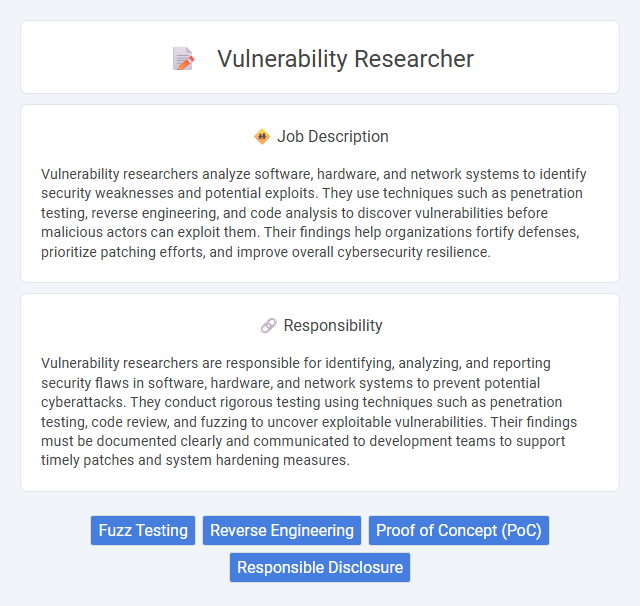
Vulnerability researchers analyze software, hardware, and network systems to identify security weaknesses and potential exploits. They use techniques such as penetration testing, reverse engineering, and code analysis to discover vulnerabilities before malicious actors can exploit them. Their findings help organizations fortify defenses, prioritize patching efforts, and improve overall cybersecurity resilience.
Individuals with strong analytical skills and a keen interest in cybersecurity will likely be well-suited for a vulnerability researcher role. This job may attract people who thrive in problem-solving environments and possess patience for meticulous code examination. Those uncomfortable with continuous learning or high-pressure situations might find the demands of this position challenging.
Qualification
Vulnerability researchers require in-depth knowledge of cybersecurity principles, programming languages such as Python or C++, and experience with penetration testing tools like Metasploit and Wireshark. Certifications including Certified Ethical Hacker (CEH) and Offensive Security Certified Professional (OSCP) enhance credibility and demonstrate proficiency in identifying and mitigating security flaws. Strong analytical skills and familiarity with operating systems, network protocols, and threat landscapes are essential for effective vulnerability assessment and exploitation.
Responsibility
Vulnerability researchers are responsible for identifying, analyzing, and reporting security flaws in software, hardware, and network systems to prevent potential cyberattacks. They conduct rigorous testing using techniques such as penetration testing, code review, and fuzzing to uncover exploitable vulnerabilities. Their findings must be documented clearly and communicated to development teams to support timely patches and system hardening measures.
Benefit
Vulnerability researchers likely contribute significantly to cybersecurity by identifying and mitigating potential threats before they can be exploited. Their work probably enhances the security of software and systems, reducing the risk of data breaches and financial losses for organizations. They may also benefit from high demand in the job market, competitive salaries, and opportunities for continuous learning in a rapidly evolving field.
Challenge
Vulnerability researcher jobs often present the challenge of constantly adapting to evolving cybersecurity threats, requiring a high level of technical expertise and problem-solving skills. The probability of encountering complex, unseen vulnerabilities is significant, demanding continuous learning and innovative thinking. Navigating these challenges likely enhances the ability to protect systems from emerging risks effectively.
Career Advancement
Vulnerability researchers play a critical role in identifying and mitigating security flaws in software and hardware systems, making their expertise highly sought after in cybersecurity. Career advancement often involves gaining certifications such as CEH, OSCP, or CISSP, and developing skills in exploit development, reverse engineering, and threat intelligence. Progression typically leads to roles like senior security analyst, penetration tester, or security architect, offering increased responsibility and higher compensation.
Key Terms
Fuzz Testing
A vulnerability researcher specializes in identifying security flaws within software systems by employing techniques such as fuzz testing, which involves automated input generation to uncover unexpected crashes and memory leaks. Expertise in creating and fine-tuning fuzzing tools like AFL, LibFuzzer, or Honggfuzz enhances the detection of zero-day vulnerabilities critical for proactive cybersecurity measures. Proficiency in reverse engineering, static and dynamic analysis complements fuzz testing to provide comprehensive vulnerability assessments and improve software robustness.
Reverse Engineering
Vulnerability researchers specializing in reverse engineering analyze software binaries to uncover security flaws by dissecting code, identifying exploits, and understanding malware behavior. Proficiency in assembly language, debugging tools like IDA Pro or Ghidra, and deep knowledge of operating system internals are critical for effective vulnerability discovery. Their work supports software patch development and enhances cybersecurity defenses by preemptively exposing weaknesses before exploitation.
Proof of Concept (PoC)
Vulnerability researchers specialize in identifying and analyzing security flaws, creating robust Proof of Concept (PoC) exploits to demonstrate the feasibility of attacks against software or hardware systems. PoC development involves crafting minimal, reproducible code that confirms a vulnerability without full exploit deployment, aiding developers in effective patch creation. Mastery of languages like Python, C, and assembly combined with deep knowledge of attack vectors ensures precise and impactful vulnerability validation.
Responsible Disclosure
Vulnerability researchers specialize in identifying security flaws within software, systems, and networks to prevent exploitation by malicious actors. Responsible disclosure involves reporting discovered vulnerabilities confidentially to affected organizations, allowing them to address issues before public exposure. This practice fosters collaboration between researchers and companies, enhancing overall cybersecurity resilience and protecting end-users.
 kuljobs.com
kuljobs.com